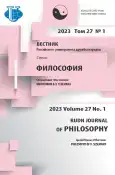Инновационная парадигма техногенной цивилизации: проблемы методологии
- Авторы: Крючкова С.Е.1, Храпов С.А.2, Глазков А.П.2
-
Учреждения:
- Финансовый университет при Правительстве РФ
- Астраханский государственный университет им. В.Н. Татищева
- Выпуск: Том 27, № 1 (2023): ФИЛОСОФИЯ В.Э. СЕЗЕМАНА
- Страницы: 108-122
- Раздел: БУДУЩЕЕ ЧЕЛОВЕКА И ЧЕЛОВЕЧЕСТВА
- URL: https://journal-vniispk.ru/2313-2302/article/view/325283
- DOI: https://doi.org/10.22363/2313-2302-2023-27-1-108-122
- EDN: https://elibrary.ru/PMBWQM
- ID: 325283
Цитировать
Полный текст
Аннотация
В статье предпринимается попытка разработки методологических оснований инноватики как новой области научных исследований, изучающей инновации в науке, культуре и обществе. На основе философско-методологического подхода проводится концептуализация термина «инновация». Предлагаемая в статье дефиниция понятия «инновация» опирается на «процессуальный подход» в трактовке инновационной деятельности и одновременно подчеркивает значимость конечного результата в виде нового продукта, имеющего коммерческую (социальную) ценность. В контексте современных тенденций техногенной цивилизации выявляются сущностные особенности инновационной деятельности, выявлена ее высокая степень неопределенности и чувствительности к случайным изменениям и влиянию внешней среды, показано, что в ней, наряду с организацией, важную роль играют и процессы самоорганизации, проявляющиеся в сложных, спонтанных изменениях, сопровождающих появление новшеств. Сделан вывод о том, что эти особенности являются свидетельством синергетического характера инновационной деятельности. Проводится «реабилитация» синергетики, которая рассматривается как онтологическая основа для построения инновационной методологии. Также в статье формулируются основные принципы инновационной методологии: открытость инновации, единство линейности и нелинейности, вероятностный характер, принцип системной связи и организации, междисциплинарность, принцип опоры на обратную связь. Проводится оценка возможности создания инновационного метода. На этой основе определяется современный статус инноватики как самостоятельной области знания, имеющей свой объект, предмет, функции, субъектов, методологию, социальные механизмы и сферу инновационного сознания, а также другие отличительные особенности любой конкретной науки. Предлагается новый подход к пониманию социально-гуманитарной экспертизы высоко-рисковых инновационных проектов.
Ключевые слова
Об авторах
Светлана Евгеньевна Крючкова
Финансовый университет при Правительстве РФ
Автор, ответственный за переписку.
Email: svetlana.kryuchkova2015@yandex.ru
ORCID iD: 0000-0002-9213-8503
доктор философских наук, профессор, профессор Департамента Гуманитарных наук
Российская Федерация, 125993, Москва, Ленинградский проспект, 49Сергей Александрович Храпов
Астраханский государственный университет им. В.Н. Татищева
Email: khrapov.s.a.aspu@gmail.com
ORCID iD: 0000-0003-1962-748X
доктор философских наук, профессор, профессор кафедры философии
Российская Федерация, 414056, Астрахань, ул. Татищева, 20AАлександр Петрович Глазков
Астраханский государственный университет им. В.Н. Татищева
Email: alpglazkov@yandex.ru
ORCID iD: 0000-0001-7606-2433
доктор философских наук, профессор, заведующий кафедрой философии
Российская Федерация, 414056, Астрахань, ул. Татищева, 20AСписок литературы
- Khrapov SA. "Man" technogenic in the socio-cultural space of technogenic civilization. Astrakhan: Astrakhan University; 2019. (In Russian).
- Schwab K, Davis N. Technologies of the Fourth Industrial Revolution. Moscow: Eksmo; 2018. (In Russian).
- Aseeva IA. Axiological priorities of the VI technological way. Epistemology and Philosophy of Science. 2017;51(1):124—137. (In Russian).
- Fagerberg J. Innovation. A Guide to the Literature. In: Fagerberg J, Mowery D, Nelson R, editors. Oxford Handbook of Innovation. Oxford: Oxford University Press; 2006. P. 1—26.
- Glazkov AP, Vostrikov IV, Khrapov SA. Philosophy of Management. Astrakhan: Sorokin Roman Vasilyevich; 2022. (In Russian).
- Drugova EA. Innovation in the search for a new humanitarian content: ontology, axiology, methodology. Vestnik Tomskogo gosudarstvennogo universiteta. Seriya: Filosofiya. Sotsiologiya. Politologiya. 2013;21(1):4—19. (In Russian).
- Lapin NI. Theory and practice of Innovation. Moscow: Universitetskaya kniga; Logos; 2008. (In Russian).
- Godin B. Innovation: the History of a Category. In: Working Paper N 1, Project on the Intellectual History of Innovation. Montreal: INRS; 2008.
- Tard G. The Laws of imitation. Moscow: Akademicheskii proekt; 2011. (In Russian).
- Zombart V. Bourgeois: towards the history of the spiritual development of a modern economic man. In: Collected works in 3 vol. Vol. 1. Saint Petersburg: Vladimir Dal’; 2005. (In Russian).
- Yakovets YuV. Epochal innovations of the XXI century. In: International Institute of P. Sorokin — N. Kondratiev. Moscow: Ehkono-mika; 2004. (In Russian).
- Kondratiev ND. Big cycles of conjuncture and theory of vision. Moscow: Ehkonomika; 2002. (In Russian).
- Pirozhkova SV, Omelaenko VV. A. Bogdanov's socio-philosophical ideas in the context of social design tasks. Russian studies in Philosophy. 2019;57(6):525—533. https://doi.org/10.1080/10611967.2019.1682876
- Schumpeter JA. Capitalism, Socialism and Democracy. Moscow: Ehkonomika; 1995. (In Russian).
- Glazyev SYu. Modern theory of long waves in economic development. Economic science of modern Russia. 2012;57(2):27—42. (In Russian).
- Yelkina EE. Methodological problems of innovative activity. Bibliosfera. 2008;(4):10—14. (In Russian).
- Kotsemir MN, Abroskin A, Meisnerr D. Innovation Concepts and Typology — An Evolutionary Discussion. Moscow: Higher School of Economics Research Paper; 2013.
- OECD. Oslo Manuals. Guidelines for Collecting and Interpreting Innovation Data, 3rd edition. Paris: OECD PUBLICATION; 2005.
- Knyazeva EN. Preface. In: Innovative complexity. Saint Petersburg: Aleteiya; 2016. (In Russian).
- Linton J. Implementation Research: State of The Art and Future Directions. Technovation. 2002;22(2):65—79. https://doi.org/10.1016/s0166-4972(01)00075-x
- Kryuchkova SE, Kryuchkova EV. Innovatika. Moscow: Yanus-K; 2016. (In Russian).
- Rumyantseva LN. On the concepts of «innovation» and «culture». Filosofiya obrazovaniya. 2010;(1):30—35. (In Russian).
- Collingridge D. The social control of technology. New York: St. Martin's Press; London: Pinter; 1980.
- European Commission. Horizon 2020. EU Research and Innovation Framework. Available from: http://publications.europa.eu/resource/cellar/e5f19eb4-55ff-41ca-824e-f21fc612dd39.0001.04/DOC_1 (accessed: 23.05.2022). (In Russian).
- Aseeva I, Pirozhkova S. Prognostic approaches and ethical foundations of techno-social expertise. Voprosy filosofii. 2021;(12):65—76. (In Russian).
- Gubarev VV. Science and Synergetics. Voprosy filosofii. 2009;(10):159—165. (In Russian).
- Stepin VS. Synergetics and system analysis. In: Synergetic paradigm: Cognitive-communicative strategies of scientific knowledge. Moscow: Progress-Traditsiya; 2004. (In Russian).
- Budanov VG. Synergetic mechanisms of scientific knowledge growth and culture. Filosofiya nauki. 1996;(2):191—198. (In Russian).
- Dudchenko VS. Fundamentals of Innovative Methodology. Moscow: Institut sotsiologii RAN; 1996. (In Russian).
- Fedorov VK, Bendersky GP, Epaneshnikova EK. Innovation as an activity and a system (on the methodology of innovation theory). Innovatsii. 2011;7(153):65—68. (In Russian).
Дополнительные файлы









